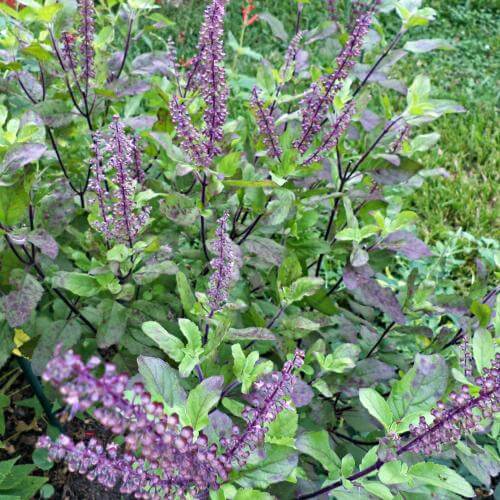
The traditional name tulsi comes from Sanskrit and means "unique". In India, this extraordinary herb is considered to be an incarnation of Lakshmi - the goddess of happiness, beauty and prosperity.
Tulsi, in Latin Ocimum sanctum, is a perennial plant from the Lamiaceae family. There are two basic types of holy basil in the world. One is Krishna tulsi (Ocimum sanctum) with purple leaves and the other is Rama tulsi (Ocimum basilicum) with green leaves.
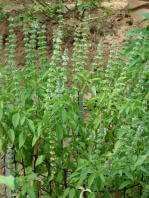
A Rich History of the Use of One of the World's Most Sacred Herbs
Originally from the Indian subcontinent, holy basil has an indispensable place and remains the most sacred Indian herb cultivated for 3000 years. It has been historically proven to have been used as a medicinal plant in ancient Greece and Rome as well as in Arabic countries. It is therefore one of the most popular and widely used herbs of the Orient. According to ancient Indian scriptures, it brings divine protection, uplifts the spirit and develops devotion. It also promotes openness of heart, clarity of mind and good memory. In Hindu families, it is usually grown in a place of honour or on an altar in the middle of the yard. According to some sources, basil sprigs have even been found in Egyptian pyramids, and in Greece, women would bring tulsi shoots to church on the feast of Saint Basileus (New Year).
The Effects of Tulsi in Ayurveda
In Ayurveda, tulsi is a highly valued plant for its spiritual and health benefits. It has been used for centuries as a remedy for coughs, colds, pneumonia, asthma and respiratory diseases. It relieves headaches, reduces fever, nervous tension and anxiety, promotes mental balance and strengthens the immune system, lowers blood sugar and cholesterol levels, improves digestion and bowel function. It is a good home remedy for stomach and intestinal problems of all kinds, helps regenerate the skin after infections and is applied in the treatment of cancer.
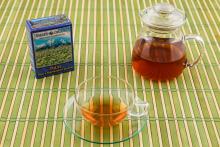
Tulsi From the Perspective of Modern Pharmacology
Pharmacological studies have confirmed its antidepressant, neuroprotective and anticancer effects. It is believed that the beneficial effects of this plant may mainly come from its main active components such as eugenol, carvacrol, ursolic and rosmarinic acids.
Ayurvedic medicine classifies tulsi in a range of properties as a light, bitter and warming herb balancing both kapha and vata dosha. The plant is taken fresh or dried in the form of crushed powder or herbal mixture. Tulsi herb can be tasted in Himalayan Ayurvedic Tulsi tea, which is handcrafted by us under the Himalayas.
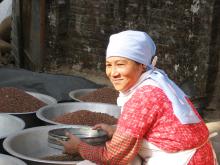
This small production of ours follows the traditional practice of drying, processing and blending herbs in the sun and fresh air as people in this and other areas of the Himalayan foothills have done for thousands of years. You can see what this handcrafted production looks like in the short video Handcrafting of Ayurvedic Teas of Everest Ayurveda.

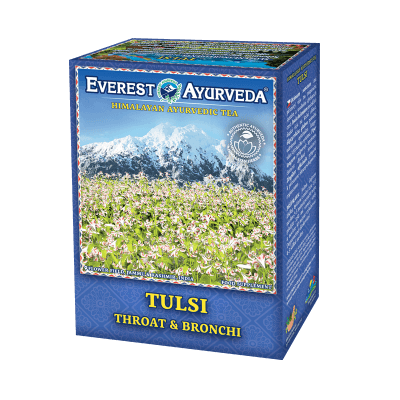 100 g
100 g